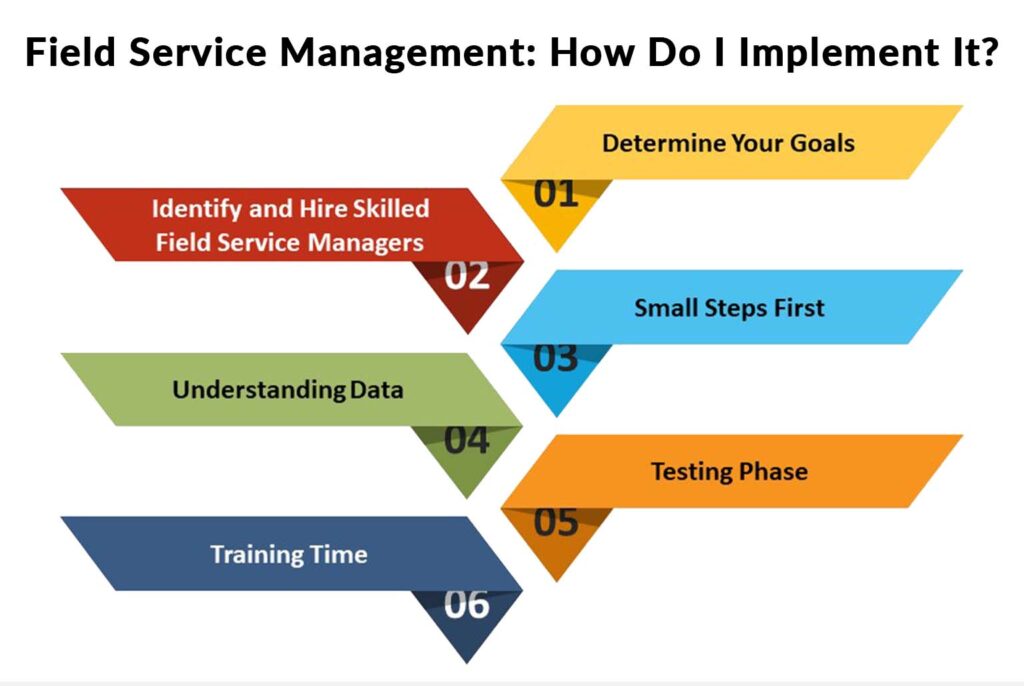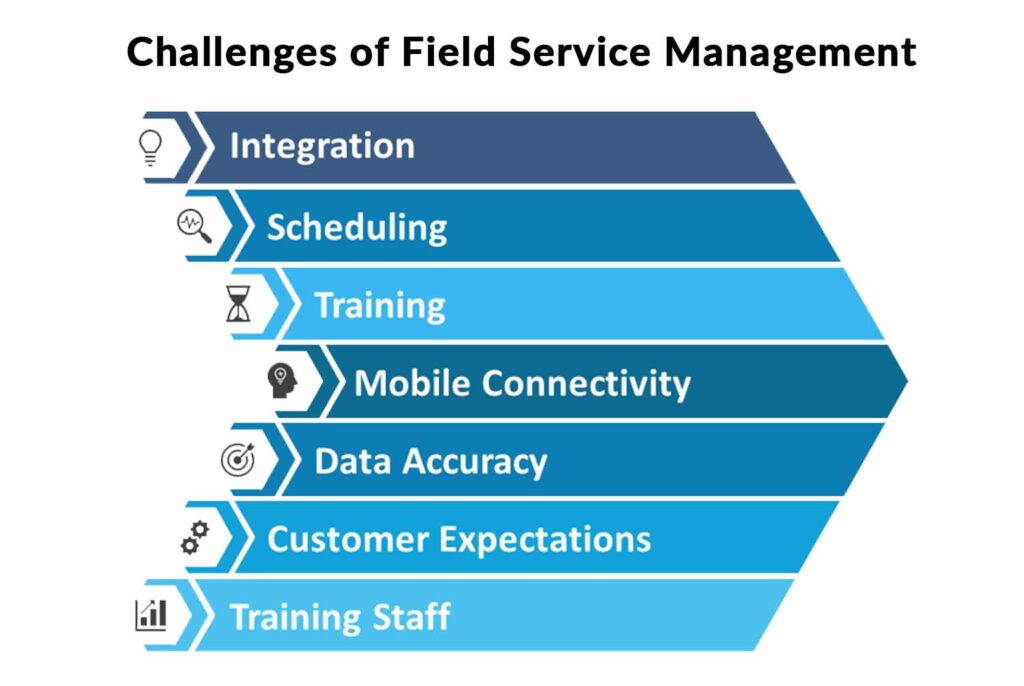Without the right customer insights, the outcomes could be disastrous! As disconnected customer service can lead to slower case resolution, customers needing to call back since a first service contact didn’t get the right answer and customer attrition. That’s where Salesforce Field Service Management comes in place!
This guide will bring you through Salesforce Field Service Management and its Business Applications, benefits, challenges, and future trends. We’ll talk about how it can help you create a more tailored and predictive consumer experience. So let us get started!
Understanding Salesforce Field Service Management and its Business Applications
Field Service Management (FSM) is a method of organizing and optimizing operations that take place outside of the office, or in the field. Consultations, sales, maintenance, customer service, repairs, and routine inspections are a few typical examples of field services.
Field service management assists firms in managing work assignments of any kind that must be performed on-site. Field service is a collaboration of many parties, including:
- The customer who makes the service request or purchases the product that requires support.
- The agent who receives the service request and creates a work order.
- The dispatcher who ensures that the right work is assigned to the right mobile employee based on schedules, expertise, and location.
- The customer who makes the service request or purchases the product that requires support.
- The agent who receives the service request and creates a work order.
- The dispatcher who ensures that the appropriate work is assigned to the appropriate mobile employee based on schedules, expertise, and location.
- The mobile employee who receives the work order and makes the on-site visit to complete the job.
While many things influence field service, at the end of the day, you are judged on the quality of the individual service you deliver to each and every customer.
AblyPro | On-Demand Webinar
Field Service: Complex Work and Routing

Speaker: Ali Zakir, Service Cloud/Field Service Specialist
This Webinar Will Cover:
- Optimize and manage complex field service workflows by routing your field technicians to service appointments in the most effective ways to enhance customer satisfaction.
Business Applications of Field Service Management
1. Home Improvement and Property Maintenance
Property maintenance and improvement can involve numerous active projects at the same time, each undertaken by a different set of specialists. Field service management aids in the organization of landscaping, cleaning, or repair services; scheduling numerous work orders concurrently; tracking progress; and centralizing all paperwork.
2. Telecom
With FSM, telecom companies can manage infrastructure, dispatch workers, equip technicians with the information they need on the job, and directly address customer issues as necessary.
3. Construction
Construction typically involves long-term projects, a huge number of workers, and many types of equipment. FSM is used to update work orders in real-time, ensure that relevant equipment is available, supervise technicians, organize tasks across a multi-operational team, track expenses, and generate inspection and certification checklists.
4. Utility Organizations
Among other things, utility firms must provide continuous service, minimize outages, maintain complex equipment and networks, manage big teams of personnel, and adhere to codes. FSM is particularly beneficial for utility businesses in dispatching engineers and experts for repairs and inspections, remotely monitoring equipment, organizing work schedules, and providing a resource overview.
5. Healthcare
Field Service Management is critical in the healthcare business, from maintaining correct and up-to-date medical information to dispatching healthcare personnel for in-home care. Indeed, FSM contributes to patient safety by enabling medical device maintenance and upkeep through asset management, documenting and dispatching work, tracking device histories, ensuring code compliance, and preparing relevant forms and papers.
8 Key Benefits of Salesforce Field Service Management
Salesforce Field Service Management is a powerful tool that can help businesses streamline their field service operations, improve customer satisfaction, and boost productivity. Some key benefits of this tool include:
1. Enhanced Visibility
With Salesforce Field Service Management, businesses can gain real-time visibility into their field operations, allowing them to track technician activity, manage work orders, and monitor performance metrics. Managers can track technician locations, job progress, and other key metrics in real time, giving them better visibility into their field service operations.
2. Streamlined Billing and Invoicing
Salesforce Field Service Management integrates with accounting systems, making it easier to generate accurate invoices and process payments quickly.
3. Improved Efficiency
By automating manual processes and optimizing workflows, Salesforce Field Service Management can help businesses achieve greater operational efficiency and reduce costs.
4. Improved Scheduling and Dispatch
With Salesforce Field Service Management, businesses can use advanced scheduling algorithms to optimize their field service schedules and dispatch the right technician to the right job at the right time.
5. Enhanced Communication
The platform provides real-time updates on job status, allowing technicians to communicate with customers and other team members more efficiently.
6. Increased Customer Satisfaction
With features such as automated appointment scheduling, mobile access for technicians, and real-time status updates for customers, Salesforce Field Service Management can help businesses provide a better customer experience and increase customer loyalty. By improving scheduling, communication, and visibility, Salesforce Field Service Management can help businesses provide a better customer experience overall.
7. Increased First-Time Fix Rates
Increased First-Time Fix Rates: When it comes to the success of field service, first-call resolution is one of the most coveted KPIs. Unfortunately, this is not always the case, and representatives must return several times to address an issue.
With the appropriate field service software, employees can quickly access a variety of tools and resources to assist with a situation assessment. It is vital to be connected with internal experts and retrieve advanced diagnostic data and other resources to help them arrive better prepared to solve a problem the first time.
8. Better Resource Management
Salesforce Field Service Management allows businesses to optimize technician schedules and dispatch resources more effectively, leading to greater utilization of resources and improved profitability.
Overall, Salesforce Field Service Management is an excellent tool for businesses looking to streamline their field service operations and drive greater efficiency and effectiveness in this important area of their business. It also offers a comprehensive solution for managing field service operations, helping businesses improve their bottom line while delivering top-notch service to their customers.
Field Service Management: Who Can Benefit?
Field Service Management benefits a wide range of stakeholders, including businesses, technicians, and customers.
1. From a Business Perspective
Field service management can help improve operational efficiency, reduce costs, and increase revenue by optimizing the scheduling, routing, and dispatching of technicians. It can also provide real-time visibility into field operations, enabling better decision-making and more proactive service delivery.
Learn how Einstein AI a smart assistant that helps in Efficient Field Service Routing.
2. From Technician’s Perspective
Field service management can simplify job assignments and provide access to important information such as customer history, equipment details, and service manuals. This allows them to complete jobs more efficiently and effectively, leading to higher job satisfaction and potentially increased earnings.
3. From a Customer Perspective
Customers benefit from field service management through improved communication, faster response times, and more personalized service. With features such as appointment scheduling, status updates, and online self-service portals, customers can easily manage their own service requests and stay informed throughout the entire process. Overall, field service management helps create a win-win situation for all parties involved.
Customer Success Stories
1. KONE leverages Salesforce Analytics to Promote Growth, Innovation, and Proactive Service
Every day, nearly 1 billion people ride on escalators, elevators, and moving walkways offered by Finland’s KONE Corporation. Antii Koskelin, CIO, says, “With the Salesforce platform, we can stay close to our clients as we continue to grow our business.” KONE sales representatives have been using Salesforce to manage opportunities, payments, and orders for both new equipment sales and service contracts since the company started using it in 2006. This includes more than 55 different countries.
Read the complete case study >>
2. Daikin Applied UK uses Salesforce to Keep Sales Hot and Customers Cool
Daikin Applied’s chillers and air handling units maintain people and important equipment at the proper temperature in everything from commercial office buildings and data centres to retail shops, hospitals, and manufacturing plants. Recently, John Mccarthy (National After Sales & CRM Manager) stated that he has been able to drive not only a successful implementation but also best practice and business cadence across their organization, enabling a better, more effective approach to sales, using Salesforce. It’s been a fantastic learning experience for the company.
Read the complete case study >>
Field Service Management: How Do I Implement It?
Many businesses already have systems in place for managing field services, making it difficult to deploy a new field service management system. FSM software should be configured to fit the specific goals and preferences of an organization, and employees and management should learn how to use it to its full potential.

1. Determine Your Goals
Most forms of field service management software contain certain basic capabilities; however, they can also be customized to meet the specific demands of your firm. You are in the best position to define what features you want and how you intend to deploy your software if you have a thorough understanding of your business challenges, goals, and strategy.
2. Identify and Hire Skilled Field Service Managers
Field service managers should always be in place to fullfill set tasks for certain projects and roles. Similarly, a project manager (or managers) should be established to oversee and make decisions on the implementation of a new FSM software system, as well as to distribute roles and coordinate with software vendors.
Managers should have a general awareness of your company’s field service projects as well as future goals. They should endeavor to keep personnel informed of any updates and ensure that everyone receives proper training.
3. Small Steps First
If you’re new to Salesforce Field Service, don’t overload yourself by attempting to master its most intricate features. Begin with your company’s most fundamental requirements, such as scheduling maintenance or sending out bills on time. As with the previous approach, think about what you want to accomplish.
4. Understanding Data
You should begin by determining what kind of data you now have and how you intend to transfer and continue collecting it with your new system. It’s also helpful to have a notion of how you want to use data to assist you achieve your future objectives. This could include deciding which sorts of data to collect, how to analyze them, and what to do with them.
5. Testing Phase
Take some time before launching your field service software to test out different setups and features to get a sense of how everything works. This will assist guide your FSM methods and overall software implementation.
6. Training Time
All managers and staff must understand how to use the newly introduced software. Training is frequently a time-consuming procedure that lasts several days or weeks. Understand what it entails and plan accordingly.
Salesforce Field Service Management’s Roadmap and Future Trends
1. Increased Productivity and Reduce Costs with Field service management
You would only think of sending a technician to a project site with the necessary tools. These tools include field service management technology: Productivity is cited as a significant or moderate benefit of field service management by 94% of service professionals in high-performing firms. Even better, cloud-based field service management enables businesses to do more service calls remotely, lowering truck rolls. This contributes to economic savings while also advancing sustainability goals.
2. Innovation to Improve your Customer Experience
Rising client demands place additional strain on mobile personnel. Not only do 71% of high-performing mobile employees state that service and support standards have risen since the pandemic but 65% report feeling the load — more than any other sort of service professional.
Decision makers see the link between employee and consumer experiences. Mobile workers can serve clients faster and better by investing in technology, such as artificial intelligence (AI) that facilitates process and workflow automation. High performers are especially excited about how automation increases mobile workers’ productivity and efficiency, and consequently the customer experience.
Learn More: Efficient Field Service Routing with Salesforce Einstein AI
What are the Challenges of Field Service Management?
Salesforce Field Service Management (FSM) can bring many benefits to businesses, such as increased efficiency, improved customer satisfaction, and better communication between field workers and headquarters. However, like any technological solution, it comes with its own set of challenges. Here are a few:

1. Integration
Integrating Salesforce Field Service Management with existing systems, such as CRM or ERP platforms, can be complex and time-consuming. One of the main challenges of Salesforce FSM is ensuring that all the necessary data is captured and integrated into the system. This can include information about customers, service requests, schedules, inventory levels, and more. It is important to have a clear understanding of how all these pieces fit together and to ensure that data is entered accurately and in a timely manner.
2. Scheduling
Another challenge of Salesforce FSM is managing the complexity of scheduling and dispatching field service technicians. Optimizing schedules for technicians based on location, availability, and skill level can be a challenge. With multiple technicians in different locations and with different skill sets, it can be difficult to optimize schedules to minimize travel time and ensure that each technician has the right skills for each job.
3. Training
Proper training is essential for field service workers to use the software effectively and efficiently.
4. Mobile Connectivity
Field service workers need reliable mobile connectivity to access the software in real time while they’re on the job.
5. Data Accuracy
Accurate data entry is crucial for effective scheduling, billing, and reporting. However, data entry errors by technicians can lead to significant issues in the system.
6. Customer Expectations
With real-time tracking of technician progress and arrival times, customers expect accurate updates and timely service.
7. Training Staff
Using Salesforce FSM effectively can also be a challenge. The system includes many features and functions, and it can take some time for employees to become proficient in using them all.
Despite these challenges, with proper planning and implementation strategies in place, businesses can successfully leverage Salesforce Field Service Management to improve their customer experience and operational efficiency.
To Sum Up
Salesforce Field Service Management (FSM) is a powerful tool that can help businesses streamline their field service operations and improve customer satisfaction. Field service management can benefit a wide range of businesses and industries, from HVAC to plumbing companies to telecommunications providers and more.
If you need assistance with Salesforce Field Service Management or have a specific idea in mind or even trying to find a solution that can satisfy it, our Salesforce Field Service consultants are here to listen. Get a free Salesforce consultation today!
Author

Service Cloud/Field Service Specialist

Ali Zakir is a Salesforce consultant/advocate specializing in Service Cloud and Field Service. With 25 years of experience in IT business management and operations, Ali empowers organizations to go beyond solving complex customer challenges and meeting business requirements.





